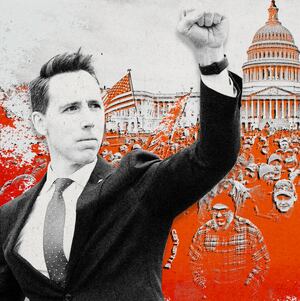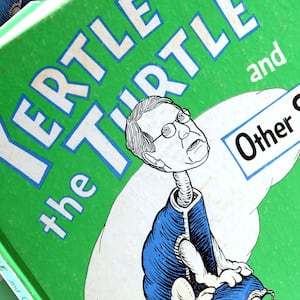Conservatives love to whine about “cancel culture.” But they’re being ridiculous.
Cancel culture has been around since the Bible (the “mark of Cain”). Conservatives “cancel” people all the time even as they complain about it; and, actually, while there are of course abuses and excesses, what’s called “cancel culture” often protects vulnerable people from danger.
Now, the appeal of “cancel culture” kvetches is obvious. They whip up anger, which seems to be the raison d’être of Fox News and its mini-mes. It galvanizes opposition to the insidious Other that has obsessed the American right since the days of the founding: those liberal, urban elites selling out good, Christian America to Europe, emancipation, communism, multiculturalism, whatever. It is the paranoid style in American politics ready-made.
But, like so many other seemingly innocuous phrases—”states’ rights,” “pro-life,” “family values,” “political correctness”—“cancel culture” now primarily functions as a marker of political identity. Using the term tells everyone where you stand. And as such, its meaning is perhaps irrelevant.
Which is a good thing, since it’s also incoherent.
First, cancel culture is part of human behavior. The Bible is full of it. The mark of Cain, perhaps history’s original deplatforming after the murder of his brother Abel; erasing customs and temples associated with Pharaonic Egypt or Earth-based religious traditions in Canaan; ostracisms of the unfaithful and rebellious. Not to be outdone, the early Christians canceled the cultic religion of the Hebrew Bible, not to mention the heresies of Gnosticism, Manicheanism, and dozens of others. What’s more, those cancelations led to wars, stonings and burnings, not just losing one’s job at the Times.
It’s also as American—and conservative—as apple pie. The most censored books in America aren’t by Dr. Seuss; they are LGBTQ-affirming books for kids (plus Harry Potter). Indeed, whatever canceling the left is doing, it pales in comparison with the right. I have personally been canceled by conservatives—in my case, banned from teaching and speaking in certain places—for being insufficiently Zionist and too gay.
For that matter, it wasn’t multiculturalist urban elites who banned “satanic” heavy metal in the 1980s, “obscene” hip-hop in the 1990s, or, for that matter, jazz in the 1920s or the Beatles in the 1960s. No one likes to cancel culture more than conservatives.
Now, why have conservatives canceled everyone from Arius of Alexandria to Lecrae of Atlanta? Because they understand that words have power. They are not merely speech acts; they cause people to believe, and act, differently from how they might have otherwise. That’s usually just part of living in a free society, but sometimes, it can lead to harm.
By analogy, American law recognizes that many kinds of speech are not protected by the First Amendment: “fighting words,” hate speech, and, more pertinent to Donald Trump’s legal future, incitements to riot. Some kinds of speech, and the endorsement of them, cause violence and harm.
Likewise offensive statements in culture. For example, take that Dr. Seuss image of a “Chinaman” in what’s otherwise one of my favorite books of his, And to Think That I Saw It On Mulberry Street. Sure, you could see it as just a harmless caricature. But in fact, it perpetuates images of Asians as exotic, Other, weird, mysterious, perhaps funny, and wholly defined by their ethnicity. Over time, such images accumulate to create a cultural understanding of Asians in those same terms. And tragedy can result.
No, Dr. Seuss is not responsible for the 3,800 incidents of hate against Asian Americans reported over the last year. But when Donald Trump, who does bear responsibility for that horrifying increase, uses the term “China Virus,” he is employing stereotypes created by that offensive image and millions of others like it: those mysterious, devious Chinese people, with their strange wet markets and sinister plots against us.
That may sound like a stretch to some, but remember, conservatives told us that Judas Priest was leading to juvenile delinquency.
The point is, when someone with a platform as large as J.K. Rowling’s goes out of their way to dismiss the lived experiences of transgender people (and the scientific understanding of gender as well), that has real consequences. No, you can’t trace any of the 11 known murders of transgender women this year directly to Rowling’s tweets. But the tweets contribute to a culture of lies about vulnerable people, and eventually, those lies lead to physical violence.
Even when they don’t, using racist or transphobic language at least makes you an asshole. And who wants to be around assholes? After all, “cancel culture” is not governmental censorship, but actually a very capitalist activity of entities operating in the free market choosing not to promulgate ideas that tens (or hundreds) of millions of people find either profoundly offensive or dangerous or both. Isn’t that the American way?
The same was true the last time the right complained about this, which was the “political correctness” hubbub of the 1990s and 2000s. Then, as now, harmful speech was being called out. Then, as now, conservatives who weren’t part of the groups being targeted kvetched loudly about it.
I’m old enough to remember those debates, and my own reactions to them, which were not so enlightened. For example, when we all stopped saying “handicapped” and started saying “disabled,” I was OK with it. But “differently abled”? Come on!
But then, you know, I got over myself. Stigmatizing people with different bodies is harmful to them and it’s also, well, being an asshole. Anyhow, who cares what I think? I don’t know what it’s like to be in a body that gets marginalized by society. Here’s a group of people who do, coming together and saying “please stop stigmatizing us in this way.” How about listening to them?
It’s the same now. Groups at the wrong end of oppressive systems of privilege are pointing out ways in which that oppression is perpetuated. Some of those ways involve statues of generals who fought to preserve slavery, some involve the names of those who promoted it, and some even involve beloved heroes, books, and movies. For all its occasional excesses, “cancel culture” isn’t about people’s feelings getting hurt—it’s about dismantling systems of hierarchy, oppression, exclusion, and marginalization. It’s about preventing real harm.
And so it’s no surprise that it’s most bitterly opposed by those on the privileged side of the same systems. After all, they’re not the ones at risk, and in some cases, they’re the ones who benefit from the hierarchies in place. When privileged folks cancel, they say it’s decency and family values; when they’re getting canceled, it’s censorship and fascism.
Now, I don’t know if every person who’s been canceled deserved it. Of course, there’s an element of mob behavior at work, and People Getting Angry On The Internet because it feels righteous and empowering to do so. I certainly favor more speech rather than less, although not every speech deserves a megaphone. But I can say this: If there’s one term that definitely is deserving of getting canceled, it’s the misleading, dismissive, and harmful concept of “cancel culture” itself.









